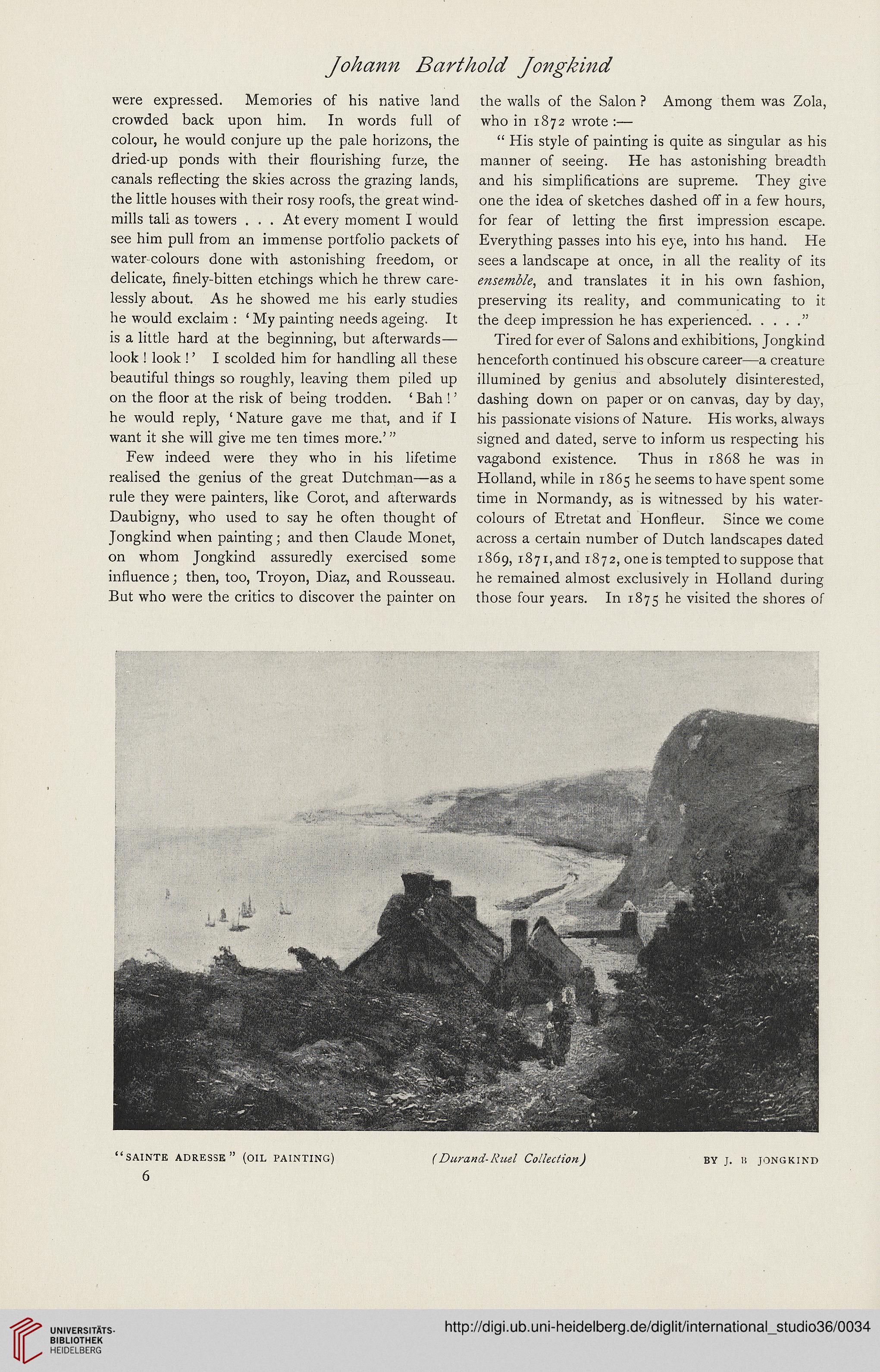y<2<%<%727% y<%77^/77<af
were expressed. Memories of his native !and
crowded back upon him. In words fuii of
coiour, he wouid conjure up the paie horizons, the
dried-up ponds with their Hourishing furze, the
canals refiecting the skies across the grazing iands,
the iittie houses with their rosy roofs, the great wind-
miHs tall as towers . . . At every moment I would
see him puli from an immense portfoiio packets of
water colours done with astonishing freedom, or
deiicate, hnely-bitten etchings which he threw care-
iessiy about. As he showed me his eariy studies
he wouid exciaim : ' My painting needs ageing. It
is a littie hard at the beginning, but afterwards—
iook ! look !' I scolded him for handiing aii these
beautiful things so roughiy, ieaving them piied up
on the Hoor at the risk of being trodden. ' Bah !'
he would reply, ' Nature gave me that, and if I
want it she wiil give me ten times more.'"
Few indeed were they who in his lifetime
reaiised the genius of the great Dutchman—as a
ruie they were painters, iike Corot, and afterwards
Daubigny, who used to say he often thought of
Jongkind when painting; and then Ciaude Monet,
on whom Jongkind assurediy exercised some
infiuence; then, too, Troyon, Diaz, and Rousseau.
But who were the critics to discover the painter on
the walis of the Salon ? Among them was Zola,
who in 1872 wrote :—
" His style of painting is quite as singular as his
matiner of seeing. He has astonishing breadth
and his simplihcations are supreme. They give
one the idea of sketches dashed off in a few hours,
for fear of letting the first impression escape.
Everything passes into his eye, into his hand. He
sees a landscape at once, in all the reality of its
<?7MC772<M5, and translates it in his own fashion,
preserving its reality, and communicating to it
the deep impression he has experienced."
Tired for ever of Salons and exhibitions, Jongkind
henceforth continued his obscure career—a creature
illumined by genius and absolutely disinterested,
dashing down on paper or on canvas, day by day,
his passionate visions of Nature. His works, always
signed and dated, serve to inform us respecting his
vagabond existence. Thus in 1868 he was in
Holland, while in i86g he seems to have spent some
time in Normandy, as is witnessed by his water-
colours of Etretat and HonHeur. Since we come
across a certain number of Dutch landscapes dated
1869, 1871,and 1872, oneis temptedtosupposethat
he remained almost exclusively in HoIIand during
those four years. In 1875 he visited the shores of
"SAtNTE ADRESSE" (0!L PAINTtNG)
6
BY J. H JONGKIND
were expressed. Memories of his native !and
crowded back upon him. In words fuii of
coiour, he wouid conjure up the paie horizons, the
dried-up ponds with their Hourishing furze, the
canals refiecting the skies across the grazing iands,
the iittie houses with their rosy roofs, the great wind-
miHs tall as towers . . . At every moment I would
see him puli from an immense portfoiio packets of
water colours done with astonishing freedom, or
deiicate, hnely-bitten etchings which he threw care-
iessiy about. As he showed me his eariy studies
he wouid exciaim : ' My painting needs ageing. It
is a littie hard at the beginning, but afterwards—
iook ! look !' I scolded him for handiing aii these
beautiful things so roughiy, ieaving them piied up
on the Hoor at the risk of being trodden. ' Bah !'
he would reply, ' Nature gave me that, and if I
want it she wiil give me ten times more.'"
Few indeed were they who in his lifetime
reaiised the genius of the great Dutchman—as a
ruie they were painters, iike Corot, and afterwards
Daubigny, who used to say he often thought of
Jongkind when painting; and then Ciaude Monet,
on whom Jongkind assurediy exercised some
infiuence; then, too, Troyon, Diaz, and Rousseau.
But who were the critics to discover the painter on
the walis of the Salon ? Among them was Zola,
who in 1872 wrote :—
" His style of painting is quite as singular as his
matiner of seeing. He has astonishing breadth
and his simplihcations are supreme. They give
one the idea of sketches dashed off in a few hours,
for fear of letting the first impression escape.
Everything passes into his eye, into his hand. He
sees a landscape at once, in all the reality of its
<?7MC772<M5, and translates it in his own fashion,
preserving its reality, and communicating to it
the deep impression he has experienced."
Tired for ever of Salons and exhibitions, Jongkind
henceforth continued his obscure career—a creature
illumined by genius and absolutely disinterested,
dashing down on paper or on canvas, day by day,
his passionate visions of Nature. His works, always
signed and dated, serve to inform us respecting his
vagabond existence. Thus in 1868 he was in
Holland, while in i86g he seems to have spent some
time in Normandy, as is witnessed by his water-
colours of Etretat and HonHeur. Since we come
across a certain number of Dutch landscapes dated
1869, 1871,and 1872, oneis temptedtosupposethat
he remained almost exclusively in HoIIand during
those four years. In 1875 he visited the shores of
"SAtNTE ADRESSE" (0!L PAINTtNG)
6
BY J. H JONGKIND




